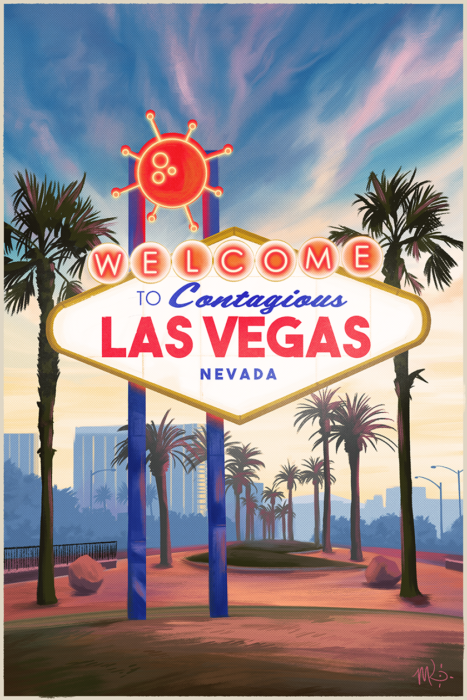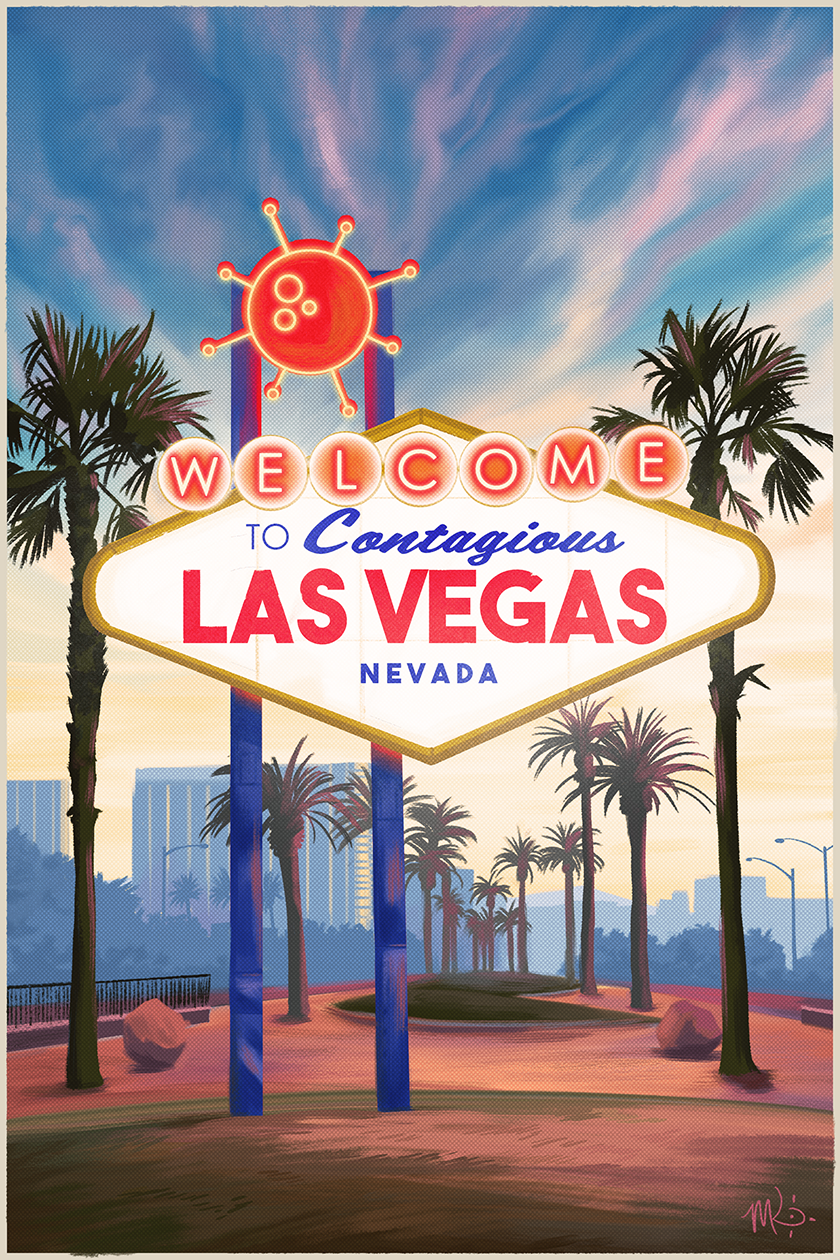
It’s hard to imagine a place that stands to lose more during the coronavirus outbreak than Las Vegas. Its economy is built on big gatherings: casinos and concerts, conferences and clubs. According to the Nevada Resort Association, a quarter of all Nevada workers are in the hospitality industry.
The threat of COVID-19 has shut all that down. On March 17, an emotional Governor Steve Sisolak ordered all nonessential businesses — that includes Vegas resorts — to shut down for at least 30 days. So far, 206,000 people are without a job — and that’s just in the casinos. According to an analysis from the Brookings Institution, one-third of jobs in the Las Vegas metro are at high risk during the outbreak. If every one of those folks was laid off, Vegas’ unemployment roll would swell by 342,000.
Read the rest of our coverage of the novel coronavirus
University of Nevada, Las Vegas economist Stephen Miller said it’s difficult to assess this early what the coronavirus’ long-term effect on Nevada’s economy will be. During a recent conversation with the director of UNLV’s Center for Business and Economic Research, we discussed the uncertainty Nevada faces, the need for federally funded “bridges” to help businesses and workers, and harrowing early research that suggested what a pandemic could do to Vegas’ economy.
Our conversation has been edited for clarity.
Jake Bullinger: Explain what it’s like in town right now.
Stephen Miller: Every casino and all of the slot machines are shut down. So basically, we’re on lockdown. I did notice the unemployment lines were extremely long. I had a doctor’s appointment Tuesday, and I had to take the 15, the 215, and the 95. And it was a wonderful drive! There was hardly any traffic on the road, and it was during rush hour.
But it’s going to have a big effect on our economy — that’s for sure. The real issue is how long it’s going to last. The governor’s initial proclamation was for 30 days, and then to reevaluate. The ramifications are going to be pretty dramatic, and I can’t really put a number on it. It’s anybody’s guess. Basically, you’re shutting down the major industry in town.
It strikes me that Vegas’ economy could be the hardest-hit in the West. Do you think that will be the case?
Oh yeah. You don’t know about L.A., because they get a lot of visitation, but it’s not primarily known as a tourist town. It’s much bigger than Las Vegas. The only comparable city would be Orlando, but in the West — we were probably the worst hit in the Great Recession, and we’re looking at being the worst hit again. The question is just how bad it will get.
Is there any indication of what the pandemic could do to the Vegas economy?
In 2007, we did a study of a hypothetical avian flu pandemic. The basic assumption of the model was that there was a 20 percent reduction in demand in the leisure and hospitality sector, and that lasted for three months. The gross regional product fell by 3 percent, and total employment fell by 3.5 percent. If I take those figures and apply them to today’s numbers, that equals a $3.7 billion reduction in gross regional product, and a loss of 37,000 jobs.
However, this time is different. I think the reduction in demand is going to be much larger than that. The big casinos may have enough cash to survive the short run. Some may need assistance in the longer run. But my concern is the small businesses, the medium-size businesses in the supply chain.
Will the relief bill Congress passed today address that?
Yeah, I think so. The legislation does cover employees, plus small, medium, and large businesses. There is money for hospitals and state and local governments. More money may be needed, especially if we linger in the current state for three months or more.
Do you think Sisolak made the right decision to order the shutdown?
Well, let’s put it this way: I wouldn’t want to be in his chair at the moment. Certainly, he thought it was the best decision based on all the evidence he’d seen from scientists and experts at his disposal. He struggled; you could tell from his presentation that he was very emotional about what he had to do.
It took Vegas a long time to climb out of the Great Recession …
We were almost caught up, in many ways. The recession in Nevada, in many ways, was longer and deeper than many places in the West. You look at the Case-Shiller Home Price index, Las Vegas and Phoenix were at the bottom of the distribution, and L.A. and San Francisco were at the top.
So could the coronavirus derail that?
Oh, yeah. If people come out of this at the end with fewer resources, and they’re having to declare bankruptcy and are defaulting on mortgages, it will have a longer-term recession.
That’s always the discussion: Will the decline be U-shaped [signifying a quick return to normalcy] or L-shaped. If that happens, it’ll be L-shaped. I think a lot of that depends on what the government does to provide bridges for people and businesses.
We’ve heard so often in recent years that the economy has been propelled by consumer spending, and that’s absolutely the case in Las Vegas. So that stands to reason the recovery is going to be consumer-driven as well, no?
You’re right, the most recent growth has been primarily consumption-based. So the real issue, once this virus event is over, is how are we going to come back? Is it going to be consumers?
There’s a concept in finance called option value: the more risk you have in the economy, the longer you delay big decisions. If you’re a business facing an investment decision, you want to maintain the option. If I invest now, I’ve locked my capital up; it’s irreversible. So when you have a lot of uncertainty, which you have now, people will be leaving their options open and not investing as you come out of the coronavirus recession.
So that leads me to believe that, if the recovery comes, it’ll have to come from consumers.
So that adds even more importance to the federal government’s aid package.
Oh, yes.
What are you going to be watching for going forward?
Reno has done a much better job of diversifying their economy, so one thing to watch will be what the effect is in Reno versus Las Vegas. Just under 15 percent of Reno’s employment is in leisure and hospitality, and we’re around 30 percent in Southern Nevada — double their commitment.

